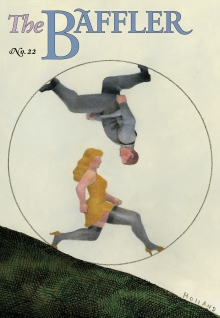On HU
Featured Archive Post Anja Flower on queerness and the uses of yaoi.
Nicolas Labarre reviews Blood Feast in 5 panels.
Me on W.W. Denslow’s beginning chapter illustrations for the Wizard of Oz.
Me on gender and comics in Dan Clowes’ Wilson and Like a Velvet Glove.
Ng Suat Tong on Graham Chaffee’s Good Dog.
James Romberger on gender and film in Godard’s Contempt.
Chuck Berry for the 4th of July.
Chris Gavaler on World War Z, stay at home dads, and Muslim zombies.
Utilitarians Everywhere
I write about changes in fatherhood and the rising number of single dads at the Atlantic.
I wrote about confronting trafficking without arguing that all prostitutes are trafficked at the Goodmen Project.
At Splice Today I wrote about
People’s coverage of a transgender girl and the bedrock reality of gender.
Chicago Public Radio’s awful, eugenics-like marketing campaign.
Other Links
Kim Thompson on being an elitist comics critic.
Abigail Rine on how he’s not sleeping through the night yet.
Ta-Nehisi Coates on manhood among the ruins.
Genevieve Valentine on harassment at cons and other places.
Amy Julia Becker on reading and disability.
Mary McCarthy on Internet trolls.


Hi Noah,
I read your article about Nikki, the transgender young woman profiled in People, last week. And while I agree with you on almost all counts, I am surprised that when it comes to discussions of gender, you aren’t more open about the confusion build into your own categories — or at least the difficulty of talking about gender at all.
In this case, you are quite clear about everything that you feel does not determine or describe gender. Gender is not your body; it is not your expression; it is not your dress. Gender is not your experiences or your upbringing. It is not your actions or emotions.
One would think that this would lead you the logical conclusion that, given no other options, gender is nothing at all — a fiction that can be done and undone and, with time, done away with. (In this world, transgender people would disappear too.)
But you (and Julia Serano) do not want to follow that path completely. In the end of the article and the argument, you want to insist that there is something deeper, more real, ineradicable, essential, and determinative about one’s gender identity.
You can’t identify that central gender identity through sight, feeling, social cues, actions, performance, or bodily investigation — but it’s there just the same, an identity that “comes before” and “gives meaning to” all. An unspoken, unconscious knowledge that shapes your knowledge.
I’m surprised that this logic does not seem strange to you — that you do not register the difficulty that the editors of People clearly, if unintentionally, evidence.
Or perhaps more to the point, I’m surprised this logic does not seem strangely familiar. At one level, it sounds a lot — does it not? — like the language of the soul, a free floating autonomous ego, a bedrock of selfhood about which one cannot be mistaken.
But I would say it sounds even more like the core idea of race. After all, one’s racial identity — traditionally (and, yes, I’m talking about old, but persistent, traditions) — is also that part of you that transcends your appearance, your actions, your social status, your emotions. Race is also one of those parts of you that does not change, that cannot change. Indeed this is part of its appeal, for the race-hater and the race-lover. It is the you that is ineradicably and determinatively you.
It is clear why a transgender person or community would embrace this narrative: indeed, I think that one might say that all forms of “deep identity” aspire to the condition of race. But the story told here, by you or by People, is not necessarily an easy one.
You’re thinking about Walter Benn Michaels, yes?
I think it is problematic…but the other Judith-Butler-gender is nothing side also has problems, and tends to be accepted more or less universally at the moment in these discussions, as far as I can tell.
I don’t think gender and race are necessarily the same morally or empirically (whatever that means) in these cases. At least, it’s harder for me to see how race gets abstracted from community or social norms. Subconscious sex, the idea that you have a sense of your gender before you have almost anything else, seems like something that feels true for just about everyone (even if that subconsious sex is intersex rather than male or female), while it seems unlikely that you could make an especially convincing argument for the existence of a subconscious race that exists outside of/before community or social context.
And, yes, I end up talking about gender in terms of ontology and presence. I’m fine with that. Butler’s move to eradicate presence just seems like the reinstitution of presence as non-presence to me. Nihilism is a reality claim too; you don’t escape the problem of existence by insisting that existence is non-existence. You just create a different totality, and one which, as you say, tends to erase transgender people altogether.
Thanks for your response, Noah.